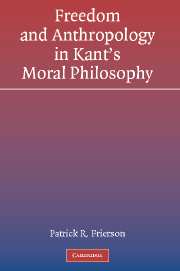Book contents
- Frontmatter
- Dedication
- Contents
- Preface
- Introduction: A Problem with Kant’s Moral Anthropology
- I The Problem
- 1 The Asymmetry in Kant’s Conception of Freedom
- 2 Anthropology as an Empirical Science
- 3 The Moral Importance of Kant’s “Pragmatic” Anthropology
- 4 Moral Anthropology in Contemporary Neokantian Ethics
- II The Solution
- 5 Transcendental Idealism, Radical Evil, and Moral Anthropology
- 6 Moral Influence on Others
- Epilogue: Incorporating Moral Anthropology and Defending Kantian Moral Philosophy
- Notes
- References
- Index of Kant’s Works
- Name Index
- Subject Index
6 - Moral Influence on Others
Published online by Cambridge University Press: 28 July 2009
- Frontmatter
- Dedication
- Contents
- Preface
- Introduction: A Problem with Kant’s Moral Anthropology
- I The Problem
- 1 The Asymmetry in Kant’s Conception of Freedom
- 2 Anthropology as an Empirical Science
- 3 The Moral Importance of Kant’s “Pragmatic” Anthropology
- 4 Moral Anthropology in Contemporary Neokantian Ethics
- II The Solution
- 5 Transcendental Idealism, Radical Evil, and Moral Anthropology
- 6 Moral Influence on Others
- Epilogue: Incorporating Moral Anthropology and Defending Kantian Moral Philosophy
- Notes
- References
- Index of Kant’s Works
- Name Index
- Subject Index
Summary
In the previous chapter, I offered a Kantian account of the nature of the good will and its appearance in the world that makes sense of the moral significance of empirical helps and hindrances. The account offered there explains whypromoting helps and combating hindrances to moral progress expresses a moral revolution, the onlyform of good will that remains possible for one who is radicallyevil. But manyhelps and hindrances do not seem to fit this model. When one struggles against passions because one recognizes that theyare moral hindrances or when one enters into polite societybecause one knows that doing so can improve one's own moral disposition, one expresses a will in revolution by struggling against the radical evil in one's nature. But what is going on when a parent disciplines a child, or a teacher instructs a pupil morally,or when one is polite to present virtue in the most attractive light to others? In these cases one does not seem to struggle against one's own evil, so one seems not to express a will in revolution. And the child, or pupil, or those to whom one is polite are not necessarilystruggling against evil themselves, so they maynot be expressing a will in revolution. In these cases, the account in the previous chapter – if it can be relevant at all – seems to grosslymisplace the moral significance of helps and hindrances. When one promotes aids and resists hindrances for oneself, one's activityis morallysignificant for the one who is helped and hindered. In the case of interpersonal interaction, the account in the previous chapter seems to make helps and hindrances to another morallysignificant for the helper or hinderer rather than for the one helped or hindered. That just seems to get the moral importance of helping and hindering all wrong.
One might think that the tension between freedom and nature is not as serious in the interpersonal case as in the individual case because one need not consider an agent that one seeks to improve from both the empirical and the practical perspectives at the same time. In one's own case, one must consider oneself both from the practical perspective because one is making a choice and as susceptible to empirical influence because one is choosing an empirical influence on oneself.
- Type
- Chapter
- Information
- Freedom and Anthropology in Kant's Moral Philosophy , pp. 136 - 162Publisher: Cambridge University PressPrint publication year: 2003



